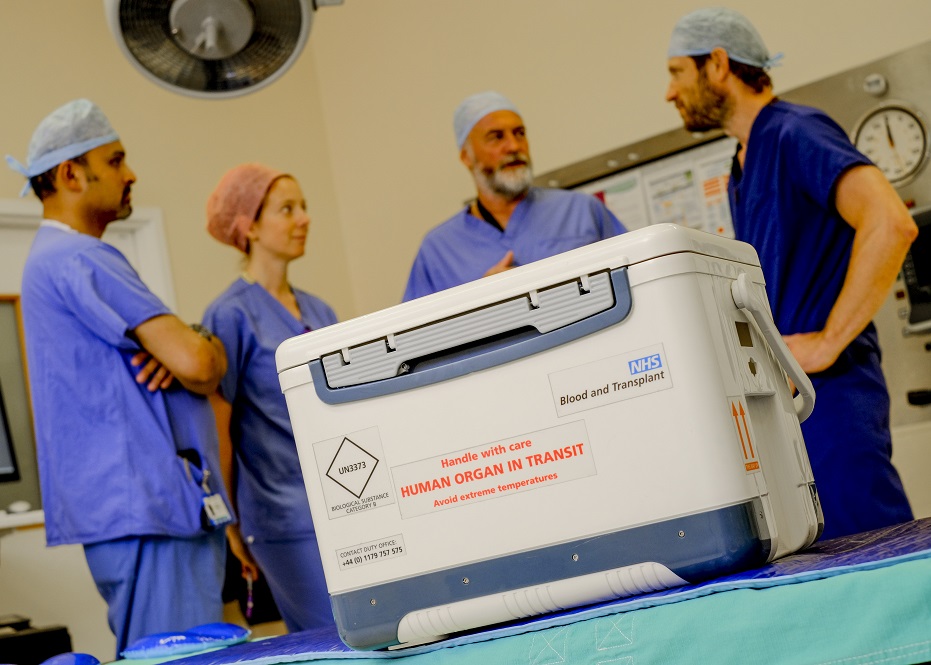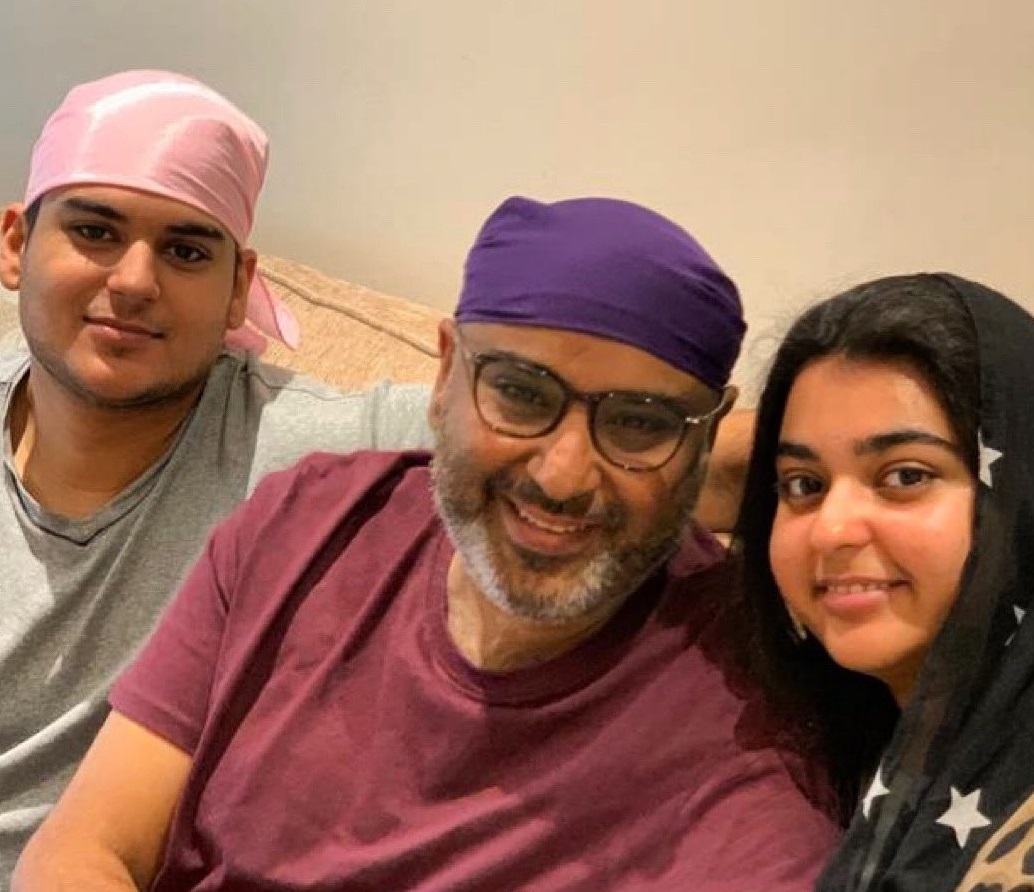Increased support for living donation vital to overcome impact of the pandemic for those waiting for transplant
A new report published today by NHS Blood and Transplant shows the impact of Covid-19 on organ donation and transplantation amongst Black, Asian and Mixed Race and minority ethnic patients, and in particular the effects of a reduction in living donation.
 The pandemic has had a significant impact on the numbers of living donor kidney transplants that could be performed, and as a result, the number of life-changing transplants, able to take place.
The pandemic has had a significant impact on the numbers of living donor kidney transplants that could be performed, and as a result, the number of life-changing transplants, able to take place.
While 444 patients were able to receive a transplant from a living donor over the year - an extraordinary achievement in the midst of a pandemic - this was still a drop of 58% compared to the previous year.
With an inevitable increase in the number of patients waiting, there remains an urgent shortage of organs for patients from all backgrounds, but this is particularly acute in kidney patients from Black, Asian, Mixed Race and minority ethnic communities, who rely disproportionately on living donors for a suitable match.
In an effort to help tackle these ongoing health inequalities, NHS Blood and Transplant is announcing a further £100,000 of funding offered via their Community Investment Scheme programme.
This new initiative aims to support groups and organisations, particularly those within Black, Asian, Mixed Race and Minority Ethnic communities, to raise awareness of living donation.
A drop in donors
In 2020/21 there was a comparable drop in both White and non-White deceased donors, but a 61% decrease in the number of BAME living donors, compared to a 58% drop overall.
Black, Asian, Mixed Race and minority ethnic patients receiving organ transplants fell by 36% compared to 22% for the overall population – while waiting lists for these patients fell more than the overall population.
The overall trends relate to the fact that many patients were suspended from the list, and that there were fewer donors and transplants possible, due to the impact of the pandemic on ICUs and organ transplant units. In addition, we had to pause the UK Living Kidney Sharing Scheme for the safety of both patients and donors during the peak of the pandemic.
The latest statistics taken from NHS Blood and Transplant’s annual report into organ donation and transplantation in Black, Asian, Mixed Race and minority ethnic communities, show there were just 146 organ donors from a Black, Asian, Mixed Race and minority ethnic background in 2020/21 (84 deceased, and 62 living). A 25% reduction in deceased donor and a 61% reduction in living donors compared to 2019/20 figures.
Over the same period, there were 1,180 total deceased organ donors in the UK and 8.4% of them were from Black, Asian, Mixed Race and minority ethnic communities, yet there remains to be 1,237 people on the waiting list from these communities making up 29.5% of all people waiting for a transplant.
However, when approached about organ donation over the course of the past year, 39.5% of Black, Asian, Mixed Race or minority ethnic families agreed to support donation going ahead, compared to 69% of white families.
Many of these families can still find it difficult because organ donation is not something they have discussed with their relative. Others still have concerns about whether organ donation can go ahead in line with their religious beliefs.
Bally's story
 Bally Singh Sandhu has been waiting three years for a kidney transplant after being told 10 years ago that he had renal failure. Bally now dialyses both day and night. With his health deteriorating, Bally’s family have launched an appeal to find a living donor and increase awareness of both deceased and living donation.
Bally Singh Sandhu has been waiting three years for a kidney transplant after being told 10 years ago that he had renal failure. Bally now dialyses both day and night. With his health deteriorating, Bally’s family have launched an appeal to find a living donor and increase awareness of both deceased and living donation.
Bally says: “Being from a South Asian background, I always knew I would be waiting for my transplant longer, but I never knew the wait would be this hard. I have difficulty doing the most basic of tasks, such as simply going for a walk or having a good night’s sleep.
“Organ donation is very much a personal choice, and everyone needs to choose what is right for them. I know that for many in the Asian community it can be a difficult decision, but as a Sikh I believe it is very much in line with my faith and beliefs – the ability for people to save lives just like mine.
“I just hope and pray that one day I will get that call to say a match has been found.”
About living donation
Living donors can either be directed (where the donor donates to a named recipient or someone they know) or non-directed (where a donor donates altruistically to any stranger who needs it). Innovative schemes, such as the UK Living Kidney Sharing Scheme enables one altruistic donor to start a chain of transplants, making even more transplants possible.
Last year, 20% of people waiting for a kidney transplant from a Black, Asian and Mixed Race and minority ethnic background received a kidney through the Sharing Scheme and non-directed altruistic donors.
Lisa Burnapp, Clinical Lead for Living Donation, for NHS Blood and Transplant, says: “We have worked hard to increase the number of patients able to receive a transplant thanks to living donation but the pandemic has had a substantial impact. With more patients now in need of a life-saving transplant, we urgently need more potential living donors to come forward and help us to save more lives.
“We hope that this new funding will help raise awareness and encourage more people to consider living donation. It is a big decision, but the donation process is very carefully managed and potential donors are supported every step of the way.”
Kirit Modi, Hon President of the National BAME Transplant Alliance (NBTA) said: “The pandemic has hugely impacted Black, Asian and Mixed Race and minority ethnic patients waiting for an organ transplant. Right now, it is more important than ever to have that family conversation about organ donation with your loved ones and ensure that whatever your choice, your donation decision is known.
“We welcome the launch of the Community Investment Scheme funding, announced today, to help drive awareness and increase living donation within Black, Asian and Mixed Race and minority ethnic communities. We hope that the scheme tackles health inequalities within organ donation and transplantation for these communities.
“NBTA has significant experience of promoting living donation; we led on a previous initiative and have published a report on the outcomes. We will work in partnership with NHSBT to ensure that this limited funding is used well to build on previous experience.”
Health and Social Secretary Sajid Javid said: “Organ donation is a very personal choice – and my thanks go out to all donors for their selflessness and to all those considering coming forward especially during the pandemic.
“NHSBT is doing great work to raise awareness of organ donation among ethnic minority communities. Coming from a South Asian family, I know how important it is to have these conversations, so we can save more lives.”
For more information, or to register your organ donation decision, please visit the Organ Donation website or call 0300 123 23 23. NHS app users can also use the service to record, check or update their organ donation decision.
Find out more about living donation or register your interest in being a living donor